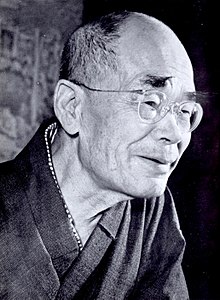D. T. Suzuki - Simple English Wikipedia, the free encyclopedia
D T. Suzuki | |
|---|---|
 | |
| Born | 18 October 1870 Honda-machi, Kanazawa, Japan |
| Died | 12 July 1966 (aged 95) Kamakura, Japan |
| Occupation | Author |
| Notable awards | National Medal of Culture |
D.T. Suzuki (鈴木 大拙 貞太郎 Suzuki Daisetsu Teitarō, 18 October 1870 – 12 July 1966) was a Japanese philosopher and writer.
His books and essays were on Buddhism, Zen and Shin.[1][2] They spread interest in Eastern philosophy to the West. Suzuki was also a prolific translator of Chinese, Japanese, and Sanskrit literature. He taught at Western universities, and spent many years as a professor at Otani University.
Bibliography
[change | change source]These essays were enormously influential when they came out, making Zen known in the West for the very first time:
- Essays in Zen Buddhism: first series (1927), New York: Grove Press.
- Essays in Zen Buddhism: second series (1933), New York: Samuel Weiser 1953–1971. Edited by Christmas Humphreys.
- Essays in Zen Buddhism: third series (1934), York Beach, Maine: Samuel Weiser 1953. Edited by Christmas Humphreys.
- Dr. Suzuki also completed the translation of the Lankavatara Sutra from the original Sanskrit. Boulder, CO: Prajña Press, 1978, ISBN 0-87773-702-9, first published Routledge Kegan Paul, 1932.
Shortly after, a second series followed:
- An Introduction to Zen Buddhism, Kyoto: Eastern Buddhist Soc. 1934. Republished with Foreword by C.G. Jung, London: Rider & Company, 1948.
- The Training of the Zen Buddhist monk, Kyoto: Eastern Buddhist Soc. 1934. New York: University Books, 1959.
- Manual of Zen Buddhism Archived 2011-07-21 at the Wayback Machine, Kyoto: Eastern Buddhist Soc. 1934. London: Rider & Company, 1950, 1956. A collection of Buddhist sutras, classic texts from the masters, icons & images,including the "Ten Ox-herding pictures".
After WWII, a new interpretation:
- The Zen doctrine of no-mind,London: Rider & Company, 1949. York Beach, Maine: Red Wheel/Weiser 1972, ISBN 0-87728-182-3.
- Living by Zen. London: Rider & Company, 1949.
- Mysticism: Christian and Buddhist: the Eastern and Western way, Macmillan, 1957.
- Zen and Japanese culture, New York: Pantheon Books, 1959. A classic.
- Zen Buddhism and psychoanalysis, Erich Fromm, D.T. Suzuki, and De Martino.
Miscellaneous:
- Zen Buddhism: selected writings of D.T. Suzuki, Doubleday, New York: 1956. Edited by William Barrett.
- Shin Buddhism; New York, Harper & Row, 1970.
- Collected writings on Shin Buddhism (ed. by The Eastern Buddhist Society); Kyōto, Shinshū Ōtaniha, 1973.
- Transcription of talks on Shin Buddhism.Buddha of infinite light. Boston: Shambhala, 1998. Edited by Taitetsu Unno.
- Tribute; anthology of essays by great thinkers. D.T. Suzuki: a Zen life remembered. Wheatherhill, 1986. Reprinted by Shambhala.
References
[change | change source]- ↑ D. T. SUZUKI MUSEUM Archived 2014-08-05 at the Wayback Machine, accessed 2012.2.17; Daisetz Teitaro Suzuki, D.Litt, Manual of Zen Buddhism, Buddha Dharma Education Association set in PDF Archived 2021-10-24 at the Wayback Machine, 2005, accessed 2012.2.17; A ZEN LIFE Archived 2014-08-10 at the Wayback Machine: The D.T.Suzuki documentary project, accessed 2012.2.17
- ↑ Stirling 2006, pg. 125


 French
French Deutsch
Deutsch